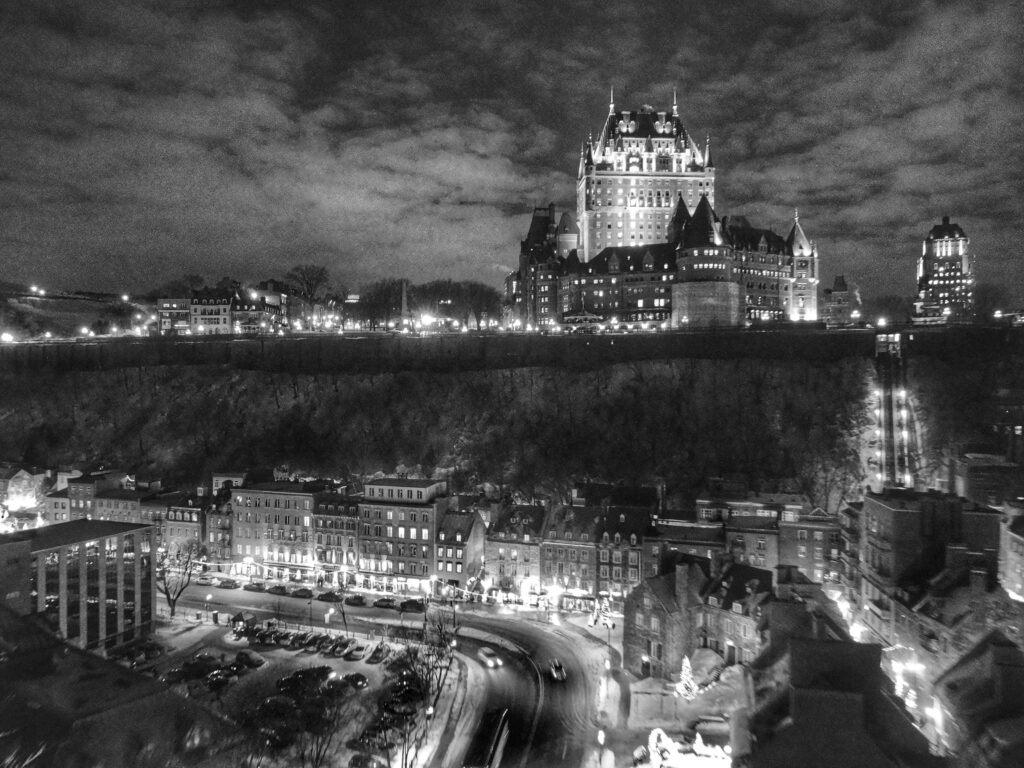History of Old Quebec
The founding of Quebec City
Old Quebec is the cradle of French civilization in North America. Founded in 1608 by Samuel de Champlain, Quebec City is one of the oldest cities in North America. Champlain chose this strategic location to establish a French colony, taking advantage of its position on the St. Lawrence River and the presence of local aboriginal populations, such as the Huron-Wendat.
The rise of New France
In the 17th century, Québec became the center of New France, a vast French colony stretching from the Atlantic to the Great Lakes. The city prospered thanks to the fur trade, particularly with the natives. Old Quebec saw the construction of many important buildings, including churches, monasteries and fortifications.
Quebec’s fortifications
Québec’s fortifications are among the most impressive in North America. Begun in 1690 under Governor Frontenac, they include stone walls, bastions and gates. The main purpose of these fortifications was to protect the city against British and native attacks. The Citadelle de Québec, built in the 19th century, is a significant addition to the city’s defenses.
The British conquest
In 1759, during the Seven Years’ War, Quebec City became the scene of a decisive battle. The Battle of the Plains of Abraham saw the victory of British forces over the French, marking the beginning of British domination in North America. The city was ceded to the British under the Treaty of Paris in 1763, bringing New France to an end.
Development under British rule
Under British rule, Québec continued to grow and develop. Despite British influence, the city maintained its French character. British institutions took root, but French traditions and language remained predominant. Old Québec became a center of commerce and administration for the British colony of Lower Canada.
The industrial era
In the 19th century, Quebec City underwent a transformation with the arrival of industrialization. The port of Québec became one of the most important in North America, facilitating international trade. Old Quebec saw the emergence of new industries, such as shipbuilding, lumbering and manufacturing. This period of economic growth contributed to the city’s modernization.

Heritage preservation
In the late 19th and early 20th centuries, Old Quebec began to be recognized for its unique historical and architectural heritage. Efforts were made to preserve historic buildings and structures. In 1963, the Quebec government created the Commission des biens culturels to protect the city’s heritage. Old Quebec was designated a UNESCO World Heritage Site in 1985, underlining its historical and cultural importance.
Attractions in Old Quebec
Today, Old Quebec is a popular tourist destination, attracting millions of visitors every year. Its cobblestone streets, historic buildings and fortifications offer a journey back in time. Popular attractions include the Château Frontenac, Quebec City Hall, Place Royale, and the Basilique-cathédrale Notre-Dame de Québec. Visitors can also explore the fortifications, including the Citadelle of Québec and the Saint-Louis and Saint-Jean gates.
Milestones
Old Quebec is the scene of many cultural and historical events. The Carnaval de Québec, one of the world’s largest winter carnivals, is held every year and attracts visitors from all over the world. The Fête de la Nouvelle-France celebrates the city’s French heritage with historical re-enactments, period costumes and festivities.
The importance of Old Québec today
Old Quebec plays an essential role in preserving French history and culture in North America. It serves as a living reminder of the city’s French origins and its evolution through the centuries. The city continues to celebrate its rich heritage through museums, festivals and cultural events, while adapting to the modern challenges of tourism and conservation.
The challenges of conservation
Preserving Old Quebec presents major challenges. Maintaining the historic buildings and infrastructure requires constant effort and considerable investment. Local authorities and preservation organizations work together to protect the integrity of the site while welcoming increasing numbers of visitors. Managing the impact of tourism on residents and the environment is a priority to ensure the sustainability of Old Quebec.
Future prospects
The future of Old Quebec depends on a balance between heritage conservation and economic development. Initiatives to promote sustainable, environmentally-friendly tourism are essential to preserving this historic site for future generations. Old Quebec continues to inspire and amaze, reminding us all of the importance of preserving our cultural and historical heritage.
Thank you for reading. If you have any questions or would like to book your stay, please visit www.bnbquebec.com or call (418) 692-0316.
See you at the next blog!
